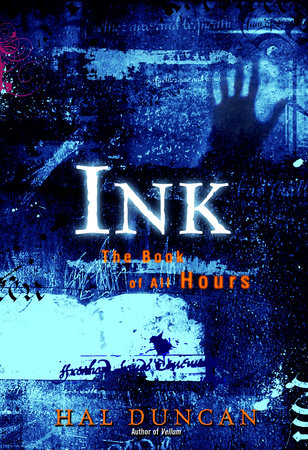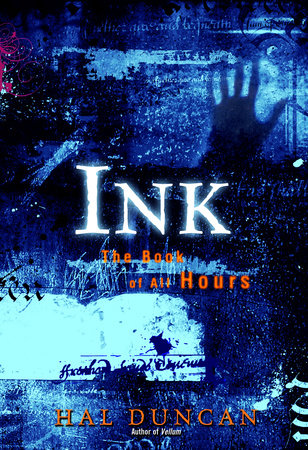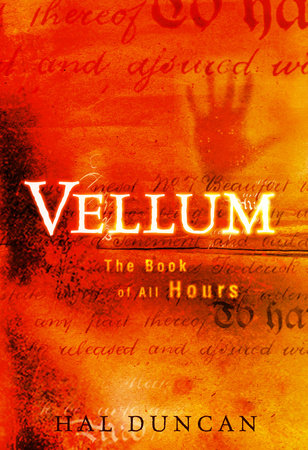Excerpt
Ink
OneHarlequin In Hell
A tantric tarantula.
Doom. That one’s for King Finn, I think as the smoked-glass windows of the brown-brick 1960s monster of a multistory shatter in a bloom of black smoke and green flame, and I almost flinch—but only almost—as the shock wave blasts across my back, billowing my armored longcoat out in front of me. The reflection in the mirror steel of the Zippo, inscribed with the circle-A of Anarchy, is a peachy sight in the rush-hour night of winter Kentigern, my very own fireworks display. The building was asking for it anyway, I reckon; the only thing the fascists do worse than politics is architecture, and in the Little Black Book of Jack Flash tattooed on my skin, well, bad taste is a fine reason for revolution. I click the lighter open, snik it lit and suck a hash cheroot into a fwoosh of life, then clunk the silvery lighter shut and turn, wait.
One elephant. Two elephants. Three elephants.
Doom.
And that’s for Anaesthesia.
Militiamen, their chakras acrackle with the blue-green fire of orgone-fusion chain reactions, come streaming from the building, fleeing, jostling through doorways, diving from windows. I watch them from my magic circle of melted tarmac, square in the center of a business-district crossroads where traffic signals cycle red and green and orange, like lights on a cheap mobile disco. Beams of headlights scythe the halogen-orange sky as aircars veer and buck to avoid me, spinning like ice skaters on their float-rays and crumping into sandstone and brick, Victorian, Georgian, Modern edifices shedding chips, sparks, shards and fireballs. Horns blare like it’s the End of Days and Gabriel has a backing section. Ornithopters rise from the rooftop landing pad of Pitt Street pigyard, unbalanced by the panicked blackshirts clinging to their landing gear and to each other, dangling like daisy chains. I flick the flap of my longcoat back and draw my Curzon-Youngblood Mark I chi-gun—favored weapon of the gaijin ninjas—and slowly, methodically, start to pick them off.
Call it kundalini, call it chi, or call it orgone energy. Call it the mystic life force of the universe, if you want. Me, I leave it to the Cavors and the Reichs to do the blackboard metamaths and pop parapsychology. All I know is that I got the original sex pistol in my hand, charged with the full-on power of all the sex-death lust-terror that just reeks in every fiber of my body. Sex is a weapon, and tonight, baby, I’m hornier than a whore in heat. Hell, you can smell my aura even over the ozone and jism stinkbomb that used to be Pitt Street Militia Station.
A blackshirt falls at my feet, doubled over in an agony of ecstasy and lost in his own moans and gasps, his deepest dread desires unleashed. All around me, in the desperate frenzy of the street, the fascists shed their inhibitions as they strip, insane with lust and clutching at themselves, each other, anything. I like to think I’ve given the phrase orgy of violence a whole new meaning.
“F*** me,” the voice at my feet says. “Suck me.”
The blackshirt wraps himself around my leg, humping it like a dog, and for a second I’m tempted, I admit—I do like a man in uniform—but, baby, I just got here and I need to get my socks on, not my rocks off, cause the Fox is waiting for me. I peel the blackshirt gently from my leg and point him at another partner, smile benevolently as they start to go at it like bonobos. All around, up Pitt Street and along the stretch of Bath Street, aircars are jammed and crammed, and passersby are scrambling out of them, running from the naked madmen. I smile: I do like a man in uniform, but I like him out of uniform even more.
Sir, yes, sir. I got Shiva on one side, Shakti on the other. I’m a tantric tarantula with a bite of bliss, and there’s no cure for the karma I got loaded in my gun. I step back from the carnal carnage, mutter a quick prayer to Kali, holster my Curzon-Youngblood in its leather sheath, and turn, coat furling smoke around me in chaotic involutions.
Jack Flash is back. How’s that? I hear you ask. OK, my friends . . .
Flashback:Twenty Years Wide
Blood dust billows, charcoal black and ash white in the Hinter, swirls of fuzz and hiss, like all the TV sets in the world have spilled their white noise out into the air. The landscape is a rough shape in the storm of bitmites, a corpse riddled with maggots, buried in bluebottles, only here and there a form emerging from the swarming gray: angel armor on disrupters like the skulls of enemies on sticks; charred gods hanging from gibbets; gryphons crunching on the bones of demons; a sylph.
Metaphysiqued in sulcate flesh of unskinned musculature and tendons like an anatomical model, golden sun for one eye, silver moon for the other, it gazes impiteous as a shabti shambles past. It studies the clay creature with the blind face, eyeholes made with jabs of fingers, leathery skin painted with ocher. Kin of sorts they are, flesh of the bitmites’ word, soulstuff made solid in the Vellum . . . or once kin, rather. Unkin.
The sylph turns back to its destination, to the Haven. To Kentigern.
Footsteps echo on asphalt and concrete as it starts down into the slumscape. It cocks its head—sounds of glass being raked from windows, wood splintered from frames and bricks unmortared by hammer and screwdriver, ax and crowbar; the noises are distant, the shabtis sparse and solitary in their ghetto half-life. As the sylph heads farther in, the wild of Hinter dies off to a flurry, and the hollow house shells come clearer, all bracken plaster, bare-brick rumbled out of square-shape, polythene in windows where there should be glass. Twenty years wide, the postwar zone of tower block and bunker bungalows is what they call a novagrad, in the creole lingischt of the afterworld. A new city schemed with villas and verges, sapling trees and car parks, all arranged in an artifice of neighborhoods by planners doodling on acid. Streets flow aimless into dead-end curlicues, organic whorls. Not the grid system of a far-ago city but something drawn in crayons held between a madman’s teeth, inhabited by clay mock-ups of humanity.
It is 2037, two decades after the apocalypse.
The sylph begins to run. There’s risk here. Paths wind, roads branch and spiral as a mazing of vodoun veves. Here the deep dead lose themselves in intricacies of what might have been, entranced in an eternal mundane moment: a child caught pissing in the bushes outside an angry neighbor’s house; a drunk forever trying to get his key into the front door lock. The Havens aren’t meant for shades, for strands of skandas, sylphs and shabtis; New Amsterdam, St. Leninsburg, Instantinople . . . Kentigern, each has its novagrad to trap the ghosts that gather round its gates. But the sylph moves fast, stays focused on its destination and ignores the echoes of others’ footsteps, till—
The floodlights of the Way Station burn furious white. They strobe, seen through the rails of the perimeter fence as the sylph lopes lupine alongside it. Barbed wire on the roof, with streamers of shredded plastic bags caught in it, steel shutters graved with graffiti, Roman, Cyrillic—the place is entrenched, still defending against a kind of war that ended a world ago, back when this was the place where the convoys came in with the truckloads of food for us, thank God, we’re starving here, but there’s less of them this time and there wasn’t enough to go round the last time, God, why is this all they’re doing, doesn’t it mean anything to them that we’re dying here, doesn’t it mean anything, God help us, oh, God help us.
The sylph throws back its head, and echoes of the dead roar from its mouth.
Harlequin in Rags of Skin
“Behold!”
Monsieur Reynard walks out onto the stage and makes a flourish with his feathered hat, the King of Players, bowing as he twirls his fake mustache.
“Behold,” he says, “our hero, Harlequin in rags of skin, a fool, a clown, a wandering wastrel newly arrived in town.”
And as our comedy’s Reynard the Fox, the King of Thieves, the Scaramouche, he smiles most charmingly as Jack leaps with a somersault onto the boards, to land down on one knee before the lords and ladies of this little corner of eternity. Guy strolls and shrugs, immune to all their gasps at Jack’s jaguar agility. But, then, who better to narrate this tale of Harlequin, the Jack of Hearts, the Joker in the pack, with all the requisite insouciance? Who else is there who can outstrut the cock?
“Our hero’s story, sad to say,” glooms Guy, holding his hat over his heart, “is like the clothes he wears, a patchwork motley born of poverty. See how his nursemaid clothed the bastard boy in scraps . . .”
Our Harlequin wears a more ancient costume than the multicolored diamonds of more cultured stages. Umbers and ambers, browns and blacks and reds, the tight-stretched leather of the cat suit, faun and beige, a hundred different shades of hide, of cow and kid, of horse and deer, of pig and snake, of antelope and lion, unicorn and king, smooth to his supple frame as flippant, flighty Jack bounces and flounces, backflips, pirouettes and cartwheels on the stage.
“F***ing show-off,” mutters Joey as he lets the curtain drop back into place.
“Jealous,” I say.






